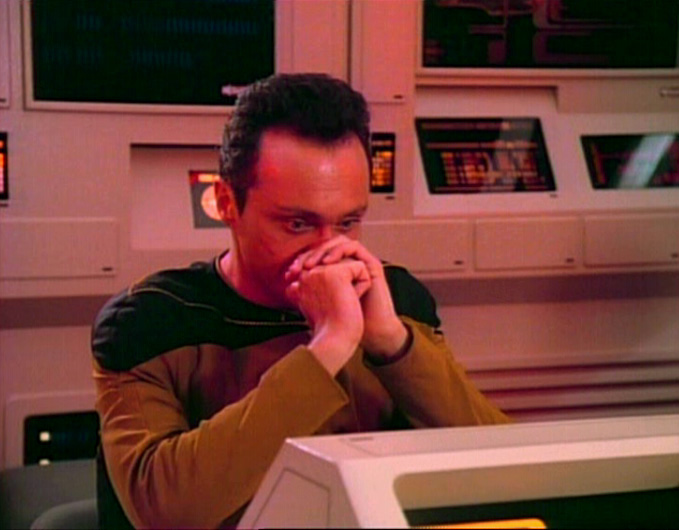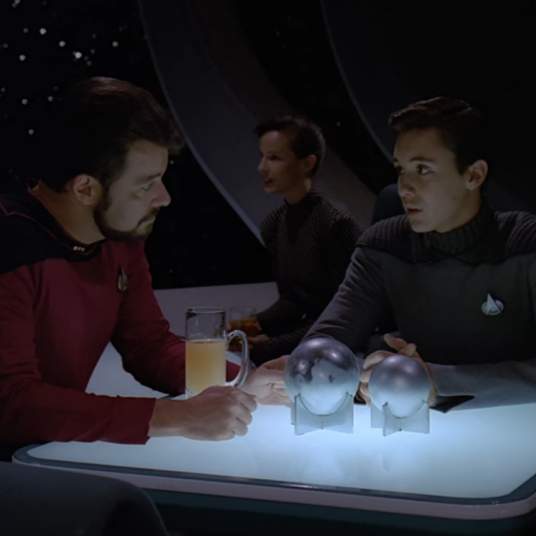
As we discussed in the last post, in TNG 1×6: Where No One Has Gone Before, the Enterprise was ordered to test out some engine modifications, which had already seen promising results on some other ships.
The genius behind these changes was a total douchebag called Mr Kosinsky. He beams aboard the Enterprise along with his assistant, “The Traveller”, to set up the changes. Now, some of the crew including Riker and the ship’s Chief Engineer, Argyle, think his ideas are complete nonsense. They even ran some simulations showing that the changes would have no effect.
In the end, they were proved correct. The whole thing was a scam, orchestrated by The Traveller, who turns out to be a pretty powerful being who is able to influence how starships’ engines work. He was really the one pulling the strings, not Kosinsky. And while many people were skeptical, including boy wonder Wesley Crusher, the man closest to the action was oblivious.
We’re supposed to not like Kosinsky. And the actor, Stanley Kamel, does a great job, because we don’t. He lords it up from the moment he arrives. Troi sums him up: “… he’s arrogant, overbearing, self-important, and very sure of himself and his ability”.
Despite his awful disposition, I actually had a lot of sympathy for Kosinsky. The Traveller comes off a lot better than him in the episode, even though he’s essentially an inter-galactic con artist, and the person ultimately responsible for putting everyone at risk. Kosinsky got played, fooled into believing his ideas were correct, despite them so obviously being inadequate to explain the tests on the other starships.
Why was he so easily fooled?
Which came first, the jackass or the success?

We know nothing about Kosinsky, so we can’t say for certain whether his awful attitude is a consequence of his “success”, or whether he was always a jackass.
But I would speculate the latter – that he was a man possessed of an extreme arrogance and a need for status and recognition – which is what made him a perfect mark for the Traveller.
Kosinsky was clearly highly intelligent. Despite his theories ultimately being proven invalid, he had managed to convince Starfleet to take them seriously. Towards the end of Where No One Has Gone Before, The Traveller states that he needs Kosinsky at the console to get them home. I’ll assume he was being sincere here, although he could just be throwing the guy a bone on account of, you know, totally humiliating him in front of the whole human race. Even Wesley calls him a joke at one point, but the Traveller rejects that, saying “No, that is too cruel. He has sensed some small part of this”. So he’s got some chops upstairs.
Unfortunately, his arrogance, and need for status prevented him from using his intelligence to see what was right there in front of him. His engine modifications shouldn’t work. Couldn’t work. But when he put his ideas into practice, he got results.
If he was being objective, he might have explored other explanations. Why were these modifications working? What was different between the simulations and the live tests? If he’d been able to question himself, maybe he’d consider other factors that could be influencing the results. Maybe he’d turn his eye to the Traveller.
Self-imposed blind spots

So due to Kosinsky’s need for status and recognition, he left many doors unopened.
Perhaps on a subconscious level, he knew that opening these doors and looking at the situation objectively would mean losing that status. So he was simply not able to.
When challenged on his theories by Riker and Argyle, he responds: “You received the information which Starfleet provided, you fed it into your computer as precisely as humanly possible, then you did a controlled test. And then, to your astonishment, nothing happened. So you said, what’s going on? This doesn’t work. Kosinski’s a fraud. You see, I have had this conversation on other Starfleet vessels before.”
As you can see, he is completely aware that his theories don’t add up. But instead of questioning them, he creates an elaborate story around why they really do make sense – even though they don’t. He simply can’t resist this, because he’s getting the recognition he desperately craves. To look objectively at the situation would mean throwing all that away.
The Traveller, like all scam artists, exploited this need in him.
The spotlight
Intelligence is only useful when directed in the right way. Smart people get scammed all the time. When there’s something we desire, we often switch off our rational thinking abilities. We want to believe so much that this person really loves us, that this investment is a solid one, that this bet is a sure thing, that we don’t think straight.
The only way out of this is to try to be objective, even when things seem too good to be true – especially, when things seem too good to be true.
But this doesn’t just happen on such a grandiose scale of being exploited by con artists. It can happen on a much smaller level – our desire to be seen in a certain way by others can lead us to take actions that, on an objective level, were not the best move. And the way out of that is to shine a spotlight on this, and overcome that need.
How do you want other people to think about you?
What kind of person do you want others to think that you are?
If you have any answer to these questions, you might have a similar situation to Kosinsky going on – a need for others to think of you in a certain way, creating a bias which may prevent you from seeing things objectively.
If you don’t have an answer to these, then maybe you’re enlightened. Or maybe your bias is wanting people to see you as the kind of person who doesn’t care how people sees them! You probably just need to dig a little deeper for the answers.
Are these desires limiting your thinking in any way? Do you cling on to a certain presentation of yourself, to the point that you stop yourself from thinking in the directions that you need to?
For example, if you want people to see you as an expert in a certain field, it might prevent you from asking for help or advice in that area – ironically, something which would move you closer to actually being an expert.
Can you let go of this need, and see reality objectively, as it is? It would be good to try. As Kosinsky found out, the truth of the situation tends to come out at some point – whether you want it to or not.


